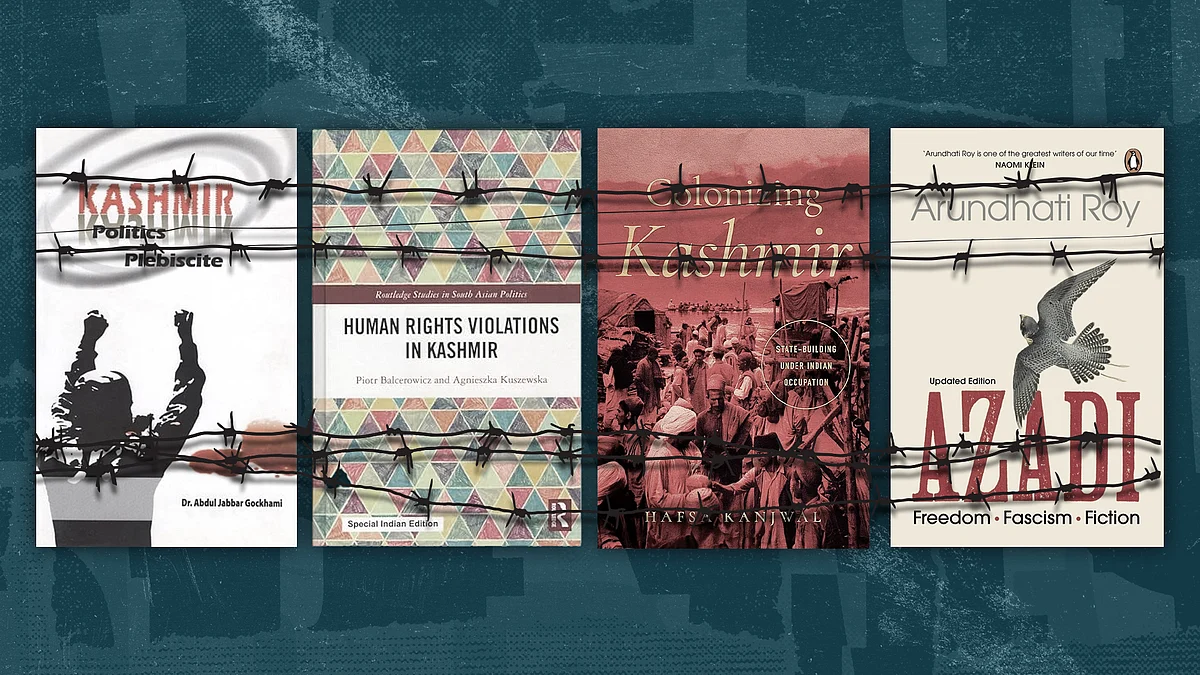
The Jammu and Kashmir Home Department has banned 25 books – authored by a mix of Indian and international academics, political commentators, and religious scholars – accusing them of “propagating false narratives and secessionism”.
Among the titles now deemed too dangerous for the public: The Kashmir Dispute 1947–2012 by constitutional expert A G Noorani, Azadi by Booker Prize winner Arundhati Roy, Kashmir at Cross Roads by political scientist Sumantra Bose, and Kashmir and the Future of South Asia by noted historians Ayesha Jalal and Sugata Bose. Also on the list: Independent Kashmir by Australian academic Christopher Snedden and Confronting Terrorism by strategic affairs scholar Stephen P Cohen.
The Home Department, which functions under the Lieutenant-Governor, invoked Section 98 of the Bhartiya Nagarik Suraksha Sanhita (BNSS), 2023, which grants the state the power to declare certain publications that threaten the nation’s sovereignty and promote disharmony as ‘forfeited’ and to issue search warrants for them. The circulation of these books will be stopped.
#JammuAndKashmir | Govt bans publication of 25 books, declares their publication and their copies and other documents to be forfeited to the government.
— Greater Kashmir (@GreaterKashmir) August 6, 2025
As per the Home department, these books "propagate false narrative and secessionism in J&K". pic.twitter.com/qeKanTh5yG
A couple of texts by Islamic scholars – Mujahid ki Azaan and Al Jihadul fil Islam by Hasan Al-Bana and Maulana Maududi – also made the list.
“The identified 25 books have been found to excite secessionism and endanger the sovereignty and integrity of India, thereby attracting the provisions of Sections 152, 196 & 197 of Bhartiya Nyaya Sanhita 2023,” the department said in its official order. The sections deal with actions that endanger the sovereignty and unity of India, promoting disharmony, and offences by public servants.
According to the notification, the ban was based on “available evidence based on investigations and credible intelligence” which, it said, “unflinchingly indicate that a significant driver behind youth participation [in] violence and terrorism has been the systematic dissemination of false narratives and secessionist literature”.
I've read most of these books & written one. They're well researched & not one glorifies terrorism which this govt claims to have ended. Scared of words challenging your lies!
— Anuradha Bhasin (@AnuradhaBhasin_) August 6, 2025
J&K bans 25 books citing ‘false narrative’ and ‘glorification of terrorism’ https://t.co/S9i3Y6DJdQ
The move triggered outrage online, with many saying that some of these books are well-researched texts.
Banning of books is the most regressive act in a democracy. It reflects an inherent fear of ideas, debate, and dissent. Democracies thrive on the free exchange of thoughts, even those that are uncomfortable or critical of the ‘official truth.’ The moment we ban a book, it signals… pic.twitter.com/1NUcLRmDS6
— Manoj Kumar Jha (@manojkjhadu) August 7, 2025
I am aghast at this idiotic order issued by the LG Manoj Sinha/Omar Abdullah/Modi government banning 25 books which it perceives to be secessionist in nature.
— Aarti Tikoo Singh (@AartiTikoo) August 6, 2025
What’s even more shocking is that among the banned books is ‘The Story of Kashmir’ by @david_devadas—one of the finest… pic.twitter.com/RLoHR2exWm
Have been reading late AG Noorani’s articles for years now.
— Man Aman Singh Chhina (@manaman_chhina) August 7, 2025
Found his writings to be factual and to the point.
Just ordered this book of his which has been banned in J&K.
It must be having some uncomfortable facts. pic.twitter.com/xlVc8syYVc
Banning books by scholars and reputed historians will not erase historical facts and the repertoire of lived memories of people of Kashmir. It only exposes the insecurities and limited understanding of those behind such authoritarian actions, and the contradiction in proudly…
— Mirwaiz Umar Farooq (@MirwaizKashmir) August 7, 2025
Only an insecure government bans books that counter its narrative. AG Noorani, Anuradha Bhasin, Maroof Raza, David Devdas, and many others on this list are known for their factual integrity and command of events in Jammu Kashmir. https://t.co/88hcwPQNtc
— Suhasini Haidar (@suhasinih) August 6, 2025
Some of the writers, contributors and editors whose scholarly books the Government of Jammu & Kashmir has banned. I have no words:
— Mirza Waheed (@MirzaWaheed) August 6, 2025
Victoria Schofield, Sumantra Bose, Tariq Ali, Angana Chatterji, Arundhati Roy, Pankaj Mishra, Anuradha Bhasin, Ather Zia, Mona Bhan, Hafsa Kanjwal...
The order further stated that such literature is often “disguised as historical or political commentary, while playing a critical role in misguiding the youth, glorifying terrorism and inciting violence against [the] Indian State.”
The government said the literature in question has a deeply damaging impact on the “psyche of youth” by fostering “a culture of grievance, victimhood and terrorist-heroism”.
“Some of the means by which this literature has contributed to the radicalization of youth in J&K include distortion of historical facts, glorification of terrorists, vilification of security forces, religious radicalization, promotion of alienation, pathway to violence and terrorism etc.,” the Home Department stated.
At Newslaundry, we believe in holding power to account. Our journalism is truly in public interest – funded by our subscribers, not by ad revenue from corporates and governments. You can help. Click here and join the tribe that pays to keep news free.
Newslaundry is a reader-supported, ad-free, independent news outlet based out of New Delhi. Support their journalism, here.







